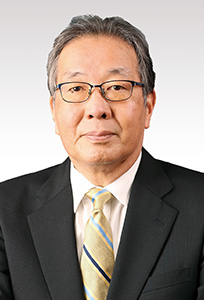Foreword by the 5th Director (April 2020 - February 2022)
Updated: 2022/04/08
Today’s global society faces increasing hazardous events, which threaten the existence of humankind. Global warming is becoming tangible due to the massive consumption of fossil resources, and, consequently, weather disasters are intensified; man-made environmental pollution is widely spreading; and infectious diseases are becoming highly prevalent across countries because of the long-distance movement of trade goods and human beings. Thus, these events become globalized and self-aggravating. Embedded in Earth systems, including human activities, these problems are complex in nature; therefore, deepening academic knowledge in a specific area cannot answer them. For resolution, we need to integrate our expert knowledge in various areas with an interdisciplinary view.
At our institute RISH, we define the “humanosphere” as an essential space that is indispensable to human activities to try to precisely diagnose and assess the current status of the “humanosphere” and investigate the cause of the events we are facing in the “humanosphere”. From this, we can then propose solutions to these problems with an inclusive view. Specifically, we define the following five missions as crucial themes to pursue: Mission 1: Environmental Diagnosis and Regulation of Circulatory Function; Mission 2: Advanced Development of Science and Technology Towards a Solar Energy Society; Mission 3: Sustainable Space Environments for Humankind; Mission 4: Development and Utilization of Wood-based Sustainable Materials in Harmony with the Human Living Environment; and Mission 5: Quality of the Future Humanosphere. Based on results from these five missions, we aim to contribute toward the sustainability of the “humanosphere” in which humankind lives. In other words, we aim to establish a human society capable of sustainable development.
To tackle these interdisciplinary problems in a new academic area, we need to collaborate with domestic and foreign researchers in related areas, and as one of the approved International/Domestic Joint Use/Research Centers, we have conducted research activities in association with Humanosphere Sciences. The core activities we have strongly promoted are based on “collaborative facility use/research” for shared use of large-scale facilities, “collaborative database use/research” for open use of databases and “project-type collaborative research” for promotion of collaborative projects.
In recent years, we have set up the “Humanosphere Asia Research Node” in Indonesia, thereby strengthening the hub functions of international collaborative research and fostering talented people who expand the field of Humanosphere Sciences internationally. We hope to cultivate people with not only high expertise but also an international perspective on the various global issues we are now facing.
We will continue to actively expand education and research activities in collaboration with the Humanosphere Science community, comprising not only staff and students within RISH but also outside researchers, both domestic and international, in an effort to demonstrate scientific landmarks on humankind’s path towards a sustainable Humanosphere. We look forward to your valuable assistance, support and participation.
Masato Shiotani
Director
April 2020 – February 2022



